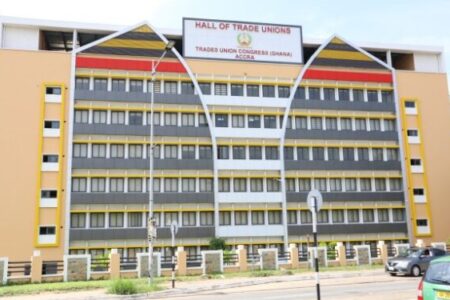Emmanuel Adjei Mensah of the Industrial Labour Union, during a recent X Space discussion hosted by NorvanReports in partnership with the Economic Governance Platform (EGP) on the topic, “Policy Failures and Institutional Weaknesses: A Critical Analysis of Ghana’s #StopGalamseyNow Efforts”, expressed concern over the potential fragmentation of Organised Labour following the suspension of a nationwide strike scheduled for October 10.
The decision, made after a last-minute agreement with the government to address illegal mining, has raised doubts about the future cohesion of the unions that constitute Organised Labour.
Mr Adjei Mensah noted that the suspension had created confusion among workers across key sectors, many of whom were prepared to take part in the industrial action. He suggested that the move risked undermining the solidarity that had previously bolstered the unions’ collective bargaining power.
“There is a real concern that this decision could fracture the unity that Organised Labour depends on,” he said during the discussion.
The strike, which had garnered support from several influential unions, was initially called to press the government to take decisive action on the illegal mining crisis, commonly known as galamsey. The unions demanded the revocation of Environmental Protection Regulation LI-2462 and the redeployment of military forces to combat mining activities that have severely impacted Ghana’s water bodies and environment.
While the government has committed to addressing these demands, Mr Adjei Mensah questioned the lack of concrete action plans accompanying the promises made during negotiations.
The decision to suspend the strike was particularly surprising given the broad support it had received from unions such as the Public Utility Workers Union and the General Agricultural Workers Union. Nevertheless, key unions in the healthcare sector, including the Ghana Medical Association and the Ghana Registered Nurses and Midwives Association, opted to distance themselves from the strike, underscoring divisions within the labour movement.
Mr Adjei Mensah further criticised the reliance on short-term measures, such as deploying military forces, which he described as “reactionary” and unlikely to produce sustainable results. He argued that Organised Labour should have maintained pressure on the government by proceeding with the strike, rather than relying solely on assurances.
“Without clear action steps, Organised Labour has risked weakening its position in future negotiations,” he remarked.
The suspension of the strike action by Organised Labour raised questions about the broader strategy of the labour movement in addressing structural issues in Ghana’s economy. While the government’s promises to ramp up its fight against illegal mining may have averted an immediate crisis, Mr Adjei Mensah warned that failing to hold the government accountable could erode trust in Organised Labour’s ability to defend workers’ interests.
The coming months will be crucial in determining whether the government’s commitments translate into tangible results. For now, however, the unity and strength of Ghana’s Organised Labour may hang in the balance.
Source:norvanreports.com

